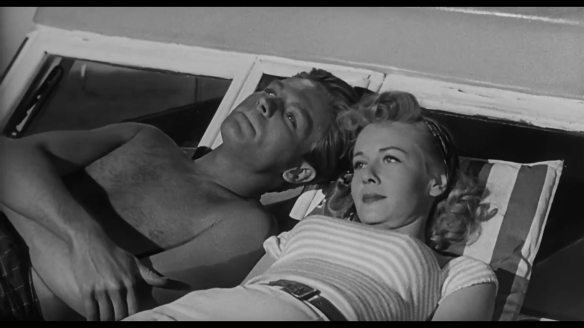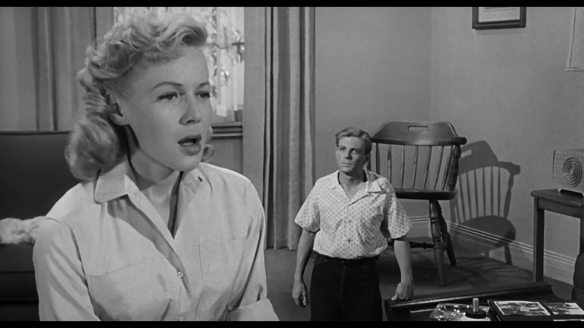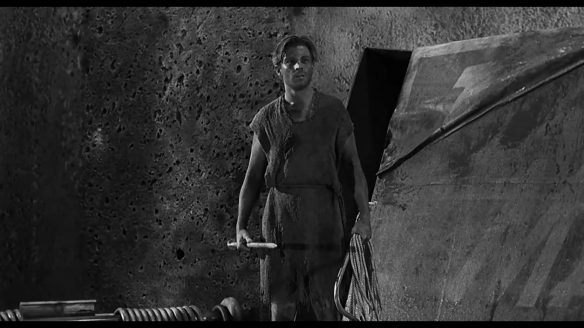These old Jack Arnold films are a perfect example of how expectations don’t always meet reality. Because if you’re like me, you have a certain preconception about how these movies will go — how they will look — and thus you may have written them off. Part of this might be the fault of the movie posters and the sensationalized advertising, and it also might be chalked up to our cliche-filled cache of old sci-fi and monster movie imagery.
The Incredible Shrinking Man fits comfortably as a twee ’50s-era television rom-com. “Scott” Carey (Grant Williams) is on a vacation with his wife playfully arguing about who will get the beers from the galley of the boat. It’s a bit of levity even as they jockey around the roles of man and wife in a marriage.
Minutes later Scott’s engulfed by a curious mist that comes out over the sea, and it leaves him confounded. For the moment, there’s nothing more to say. Months later, they are back in their suburban life. The milkman stops by in the morning, Louise busies herself in the kitchen, and Scott gets ready for work. Except, this morning his pants are too big — the dry cleaners must have made a mistake — but then his shirt is too big also. It throws him off.
His wife doesn’t have any clue either and so he goes to his doctor for a physical. The genial doctor (William Schallert) tries to explain away the changes with the routine explanations. Because, to put it plainly, people don’t get shorter…unless they do. It’s true there is no medical precedent for what’s going on with Scott.
He’s put through all sorts of tests to make some sense of the change in his body. Finally, the researchers settle on something. The molecular cells in his body have gone through a rearrangement — no, not cancer — but an anti-cancer. In a eureka moment, they realize a cocktail of insecticide and radioactive mist, led to the adverse effects.
But the Incredible Shrinking Man is hardly a story obsessed with the nuclear age. Instead, the premise turns into a far more intriguing conceit about everything from emasculation to Scott becoming a sideshow attraction in the media with national notoriety. The phone rings off the hook and people hang around to gawk at the new pariah.
Going out to clear his head only makes matters worse. Normal, everyday scenarios like walking down a street corner or grabbing a cup of coffee only emphasize his size even as the carnival freak show makes him queasy. He’s one of them. It’s true that one of their members, Clarice, is the same size as him. Being with her is some small comfort to him. Still, even that doesn’t last. He continues to shrink.
Rapidly his loving marriage begins to dissolve around him correlated with his continually diminishing size. Louise hasn’t changed, but Scott is bitter now, understandably discontent, and prone to lash out at his wife regardless of what she tries to do. On a side note, it’s wonderful to simply sit back and appreciate the scale of everything and this is years before similar trickery would be pulled in a film like the Hobbit for instance.
Marvel at the perspectives. There’s the harrowing moment where the cat gets back into the house, and it becomes a fight for survival as the feline terrorizes the dollhouse Scott now inhabits. In the wake of the incident, he is pronounced dead though he’s really only trapped in the cellar with no possible way of climbing up the massive stairs.
The pervading sense of helplessness sets in as Louise leaves the house one last time prepared to sell their home at the behest of her brother. They drive off, and that’s the end of it. What a dismal arc it is when we consider the initial joy of the marriage. We almost forget all of this if only because of the immediacy of the journey Scott still has ahead of him.
This demarcation point sets up the latter stage of the film as it devolves into a Robinson Crusoesque adventure set in the basement. He wouldn’t have given a thought about only a year prior. Now it’s a moment-by-moment struggle.
Realizing he’s trapped, Scott seeks shelter in a forgotten matchbox. Then, he finds himself water and sustenance and even creates some tools — including a spear. The emergence of a tarantula makes it all too evident he is no longer on the top of the food chain. If he is to live another day, he must vanquish the other creature or die trying. When they face off, dread sets in like I haven’t felt in some time. It’s palpable and strangely compelling in some primordial way. It plays better than many of the glossier battles we are served up today courtesy of CGI.
This is not his only trial. There are great chasms to cross, then torrential floods of water; we take on his powerlessness and are privy to his weakness. The perspective is surprisingly weighty and although Grant Williams is hardly a famed actor, there’s something totally spent about his performance. Behind the scenes, he was sent to the hospital several times due to blisters and other ailments. And he goes through the final act of the movie barefoot and scraggly like a real trouper.
As the narrative continually builds on Scott’s story, it increasingly becomes a movie full of soliloquies and at times the verbosity may be ill-fitting, but what they do provide is something running in the face of all those preconceived notions we have about these exploitative-type movies. They actually do mean something. There is an import to what it is trying to express and get across (at least sometimes).
One evening he peeks out and looks up into the heavens. He has an epiphany. In this vast majesty of creation, he realizes it has to mean something, and therefore he must mean something too. Suddenly the existential crisis of man is given center stage and in another stunning turn, the incredible shrinking man’s struggle is precisely our struggle, coming to terms with our place in the world — the vast infinite spaces of the galaxies as we ourselves are insignificant in comparison. It’s all relative but in a single moment, we are made to feel a lot like him. But if we make peace with our station in life perhaps it is more of a blessing than a curse.
4/5 Stars




Looks interesting!
LikeLiked by 1 person